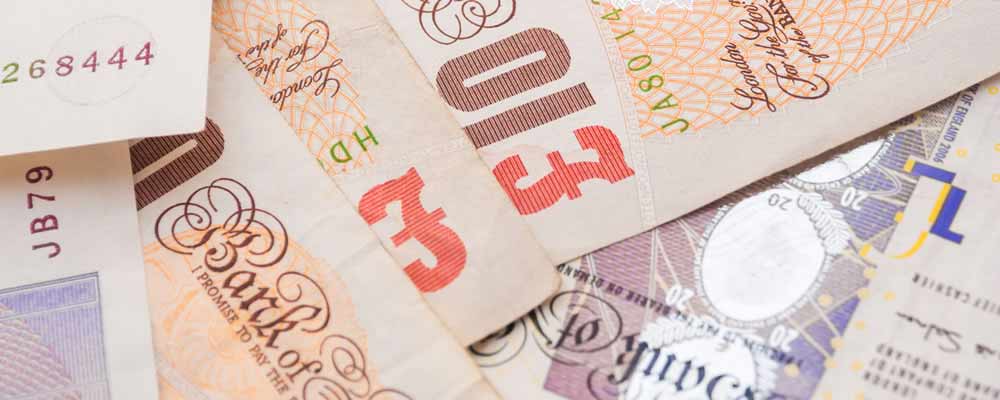EUR/GBP Exchange Rate Firms as UK Inflation Hits Fresh 40-Year High
The Euro Pound (EUR/GBP) exchange rate rose through today’s session, buoyed by the Euro (EUR)’s relative safe-haven appeal and Pound (GBP) weakness following the UK’s inflation release.
At the time of writing, EUR/GBP is trading at £0.8446, up 0.5% from today’s opening levels.
Pound (GBP) Pressured by Rising Living Costs
The Pound fell against a bunch of other currencies today, subdued by the UK’s latest inflation data. The country’s inflation rate increased to 10.1% in the year to July, rather than 9.8% as forecast.
According to the Office for National Statistics (ONS), higher food prices were the main reason for today’s result, as ‘the largest upward contributions came from bread and cereals, and from milk, cheese and eggs.’
This news sparked concern amongst anti-poverty campaigners, as a rise in the cost of food disproportionately affects poorer households. Those on a lower income spend a larger proportion of their salary on essentials such as food and electricity – which increased by a whopping 54% in the 12 months to July.
Meanwhile, gas prices have almost doubled as the UK sinks deeper into an energy crisis.
Mike McKean, vice president of policy at The Royal College of Paediatricians and Child Health (RCPCH) reports that approximately 30% of all children in the UK are living in poverty: an estimate made before the rate of inflation rose to 8%.
He adds: ‘The UK faces a perfect storm of soaring energy bills, rising taxes and increasing prices. I am fearful of what will happen this winter if this crisis is not urgently addressed.’
The Chairman of Asda, Lord Rose, echoed McKean’s sentiment. Criticising PM hopeful Sajid Javid, he asked ‘what more facts is [Javid] waiting for?’
If the rate of UK inflation drives further division between the UK’s prime ministerial candidates, Sterling volatility may increase ahead on domestic political headwinds.
Euro (EUR) Recovers Following Data-Inspired Downturn
The Euro trended broadly higher this afternoon, as its relative risk-off appeal garnered some support from bearish markets.
Early in the session, EUR exchange rates experienced some turbulence as data from the Eurozone printed below expectations. The number of people employed in the bloc rose by 0.3% in the Q2 rather than the 0.4% forecast, while quarterly GDP also printed 0.1% below expectations.
Headwinds were soon eliminated, however, as analysts’ interpretations remained largely positive. Ricardo Amaro, senior economist at Oxford Economics, commented that the labour market had recorded healthy improvement, albeit not so strong as anticipated.
Amaro observed that the increase in Eurozone employment underpinned a drop in the bloc’s unemployment rate to an all-time low of 6.6% in Q2. Furthermore, he added that Q2’s GDP figures ‘paint a flattering picture of growth dynamics’.
Economic expansion in the Eurozone last quarter was reportedly down to growth in Italy and Spain’s economies, of 1.0% and 1.1% respectively. Impressively, stagnation in Germany – the bloc’s largest economy – failed to pull overall GDP into contraction territory.
Looking ahead, experts at Capital Economics foresee a weakening in the Eurozone economy. However, economist Jessica Hinds reassures investors that:
‘We expect the downturn to be fairly shallow and short-lived, with activity recovering by Q2 next year and short-time working schemes cushioning the blow.’
EUR/GBP Exchange Rate Forecast: Eurozone Inflation to Affect Trading?
Tomorrow’s docket is fairly quiet for EUR/GBP, leaving the exchange rate to trade largely on external factors. However, if the bloc’s finalised inflation reading prints drastically above or below earlier estimates, EUR may waver against its peers.
Higher inflation could mean more aggressive interest rate hikes from the European Central Bank (ECB), while a lower reading would likely deter the ECB from any hawkish action. In it’s last policy announcement, the central bank said that ‘further normalisation of interest rates would be appropriate in upcoming meetings.’



